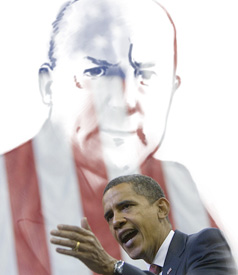One More Term Senator Dorgan, Please?
Late last year, during the Senate debate on health insurance, Dorgan proposed and eloquently explained an amendment to reduce drug prices -- the highest in the world -- by allowing so-call drug reimportation from countries such as Canada under regulatory safeguards.
He expected Obama's active support since Mr. Obama promised to press for this needed competition in his presidential campaign. He figured wrong. The White House used none of its capital to get the few extra votes needed. For Mr. Obama had already cut a deal privately with the drug company chieftains.
That may have been the last straw for Senator Dorgan. He is not the only progressive Democrat in the Congress who is saying, "What does President Obama really stand for?"

